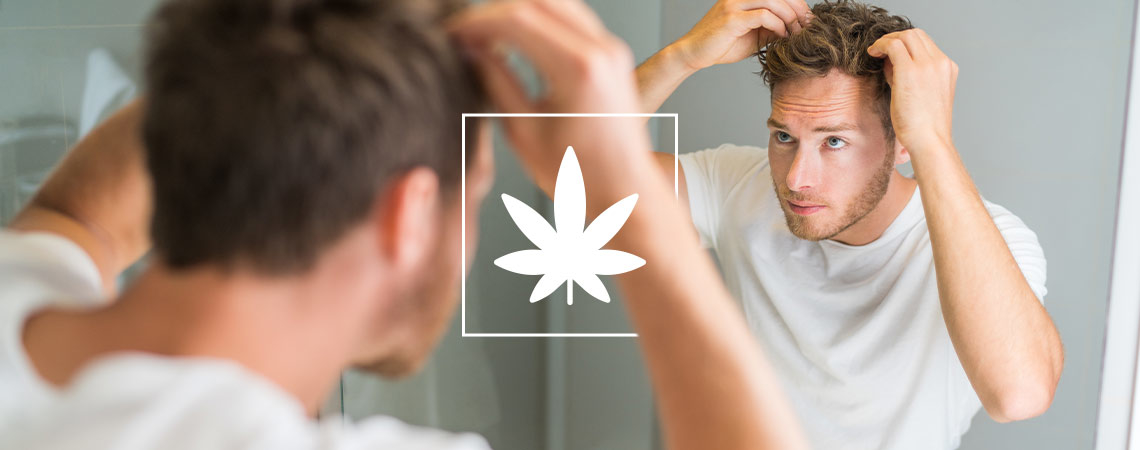
The Impact Of Cannabis On Your Hair
Looking to increase hair growth or address scalp conditions like dermatitis and dandruff? Could cannabis be the key? In this article, we delve into the research surrounding CBD and THC's impact on hair growth and loss, as well as scalp health and testosterone levels.
Cannabis is often touted as a versatile substance with the potential to address all manner of conditions and maladies. But in the case of cannabis’ effect on hair, is there any real evidence to suggest the herb supports hair growth or scalp health? And further, might marijuana actually contribute to hair loss? Below, we separate the rumours from the research.
The effects of cannabinoids on hair

Though the cannabis plant contains myriad compounds of interest, it’s chiefly the cannabinoids that are believed to interface with the human body in ways that could potentially affect processes related to hair growth.
THC and CBD: Key cannabinoids
Of these cannabinoids, two are by far the most studied, and not without good reason. THC, the main psychoactive constituent of cannabis, is found in the greatest abundance in most cannabis strains and products. CBD, on the other hand, has amassed great influence in the 21st century as anecdotal accounts and clinical research have revealed legitimate use cases for the cannabinoid.
Interaction with the endocannabinoid system
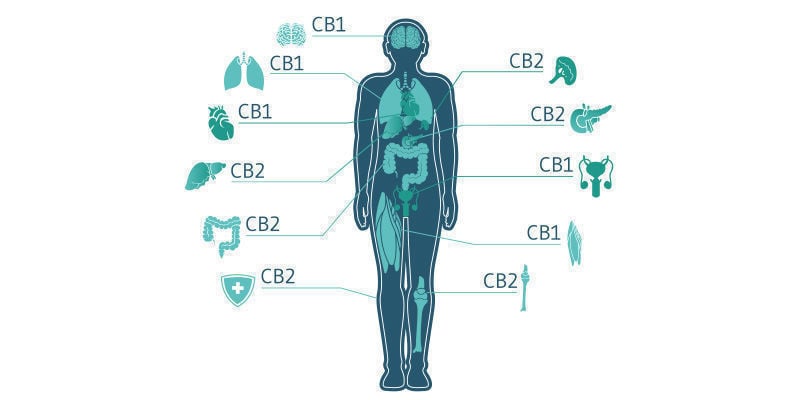
But how is it that THC and CBD are able to affect the body at all, much less to the benefit of hair and scalp health? The answer boils down to the endocannabinoid system (ECS), a regulatory network that extends throughout the body, including the skin, where it influences a diverse array of processes including proliferation, differentiation, and apoptosis of skin cells. In fact, endocannabinoids, which are cannabinoids produced by the human body that naturally signal with the ECS, are actually found in “various cellular compartments” of the skin, including the epidermis, sebaceous glands, and hair follicles (Bíró et al., 2009).
Potential impact on hair follicles
At present, the body of (reliable) literature on the effects of topical CBD and THC on hair follicles is fairly insignificant. Nonetheless, a few pieces of research stand out, demonstrating results that could link cannabis extract and hair growth.
In a case study performed in 2021, CBD-rich hemp extract was administered to a group of 28 men and 7 women diagnosed with androgenetic alopecia. For six months, the participants administered the extract one daily to the scalp. At the end of the study, there was a statistically significant increase in hair count from the beginning of the study period—93.5%. All subjects experienced some hair regrowth, and there appeared to be no adverse effects (Smith & Satino, 2021).
While this study appears encouraging, there’s still a lot that remains unclear. To start, the sample size of the study is incredibly small and only involved caucasian participants. Furthermore, it’s unclear if CBD’s potential to stimulate hair growth is concentration-dependent. In the aforementioned study, the CBD concentration was around 3–4mg per day. However, some studies suggest that CBD may actually cause hair loss at high concentrations of ≥10 μM (Gupta & Talukder, 2022).
Finally, though CBD appears to show some promise in the arena of hair growth, other cannabinoids may have the opposite effect—though nothing is set in stone. Some small studies have sought to determine THC’s impact on hair regrowth, but the results are ambiguous, especially as the cannabinoid is often administered alongside other cannabinoids and ingredients that could independently impact hair follicles.
Does using cannabis cause hair growth or loss?
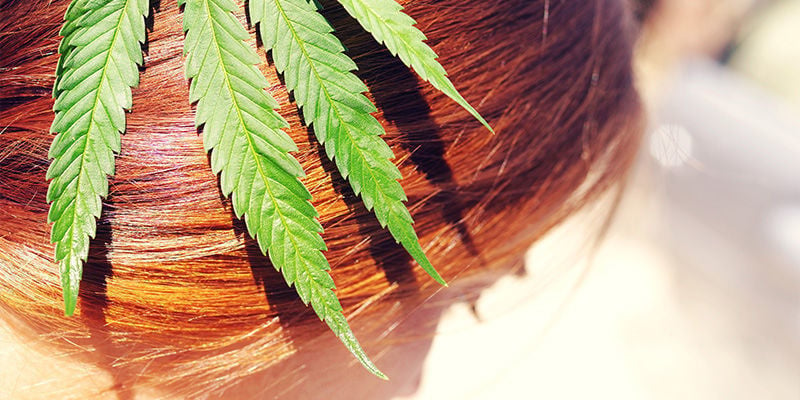
Topical application of dedicated cannabinoid scalp products is one thing—but does smoking or otherwise consuming cannabis lead to hair growth or hair loss?
Losing hair when using cannabis
There are various anecdotal accounts and studies remarking on individuals who appeared to experience hair loss and/or thinning while using THC-rich cannabis.
In a 2007 study, researchers found that THC inhibited hair shaft elongation and hair matrix keratinocyte proliferation, while also inducing intraepithelial apoptosis and premature hair follicle regression. Essentially, it appears that CB1 receptor agonists, such as THC as well as our own endocannabinoids, could stimulate hair loss. As a result, the authors of the research paper suggest that CB1 agonists could thereby be employed to help manage unwanted hair growth, while CB1 antagonists could potentially help with hair loss (Gupta & Talukder, 2022).
Growing hair when using cannabis
Conversely, some individuals claim that using cannabis has actually influenced hair growth. While this is certainly intriguing, there is essentially no high-quality research to support these claims. However, it’s worth noting that everyone’s ECS is slightly different, and therefore the effects of THC-rich cannabis may have different effects on different individuals.
Cannabis, scalp health, and dandruff
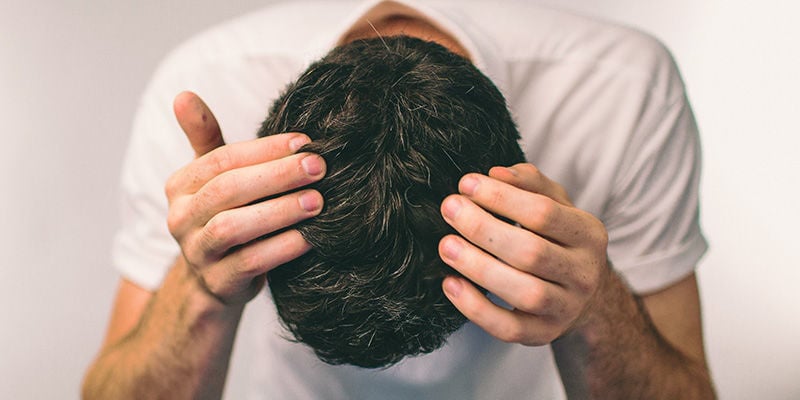
We’ve examined some of the research on cannabis’ effects on hair loss and growth, but what about its impact on scalp health and dermatological conditions like dandruff?
The cutaneous endocannabinoid system influences skin cells across the entire body, including on the scalp! With that in mind, a 2020 study looked to assess the efficacy of applying broad-spectrum CBD extract shampoo to the scalp of patients with mild to moderate scalp psoriasis or seborrheic dermatitis. The study found the extract to be tolerated exceptionally well, and showed markers associated with reduced severity and symptoms in a period of two weeks (Vincenzi & Tosti, 2020).
While these results may inspire individuals with scalp conditions to consider ordering CBD shampoo for themselves, it’s important to note that the results from one study do not indicate that topical CBD or cannabinoid products can positively impact scalp conditions. However, other studies appear to support the idea that CBD specifically may be able to impact scalp conditions through various mechanisms (Popp et al., 2023).
Dandruff is a condition that impacts many people, and many seek to use various formulas to decrease flaking. Although dandruff doesn’t come with the visible inflammation associated with seborrheic dermatitis (SD), they share many similarities—both cause a dry, itchy scalp. As such, some researchers believe that here too CBD may be able to impact oil production in the sebaceous glands and potentially help to decrease dandruff.
Cannabinoids, testosterone level, and hair growth
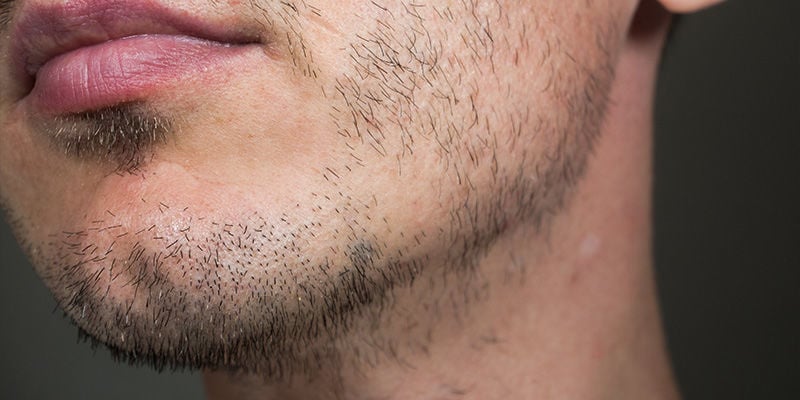
Testosterone is a hormone with a multifaceted effect on hair growth. High levels of testosterone can lead to an increase in body and facial hair, but they can also contribute to hair loss. On the other hand, low testosterone is associated with hair weakening and thinning. Everyone’s testosterone levels are different, but it’s worth considering how levels impact hair growth, and furthermore, how THC use impacts testosterone levels.
There are studies that suggest chronic THC use can lead to dramatic reductions in testosterone, which could thereby contribute to hair weakening. Other studies, including one from 2017 out of Denmark, found the opposite, claiming improvements in testosterone levels among marijuana users (Thistle et al., 2017). Some studies performed on rodents actually found CBD to reduce testosterone levels, but these findings have not been replicated in humans (Kaufmann et al., 2023).
Cannabis hair products
In recent years, there has been an absolute boom in cannabinoid-containing cosmetics and hair products. Whether you’re shopping around online or visiting your local health food store or grocery store, odds are you can find some products containing hemp extract or CBD. While the viability of these products for hair and scalp health may vary, many contain additional botanicals and other ingredients, like vitamin E, that are known to support hair growth. Therefore, even if it’s unclear what effects CBD may have on the scalp, other ingredients are sure to increase the products' soothing potential.
Note, however, that some of these products may come with high price tags, despite offering very little difference from conventional, more inexpensive products. So do your research and shop with caution.
Cannabis and hair — A complex relationship
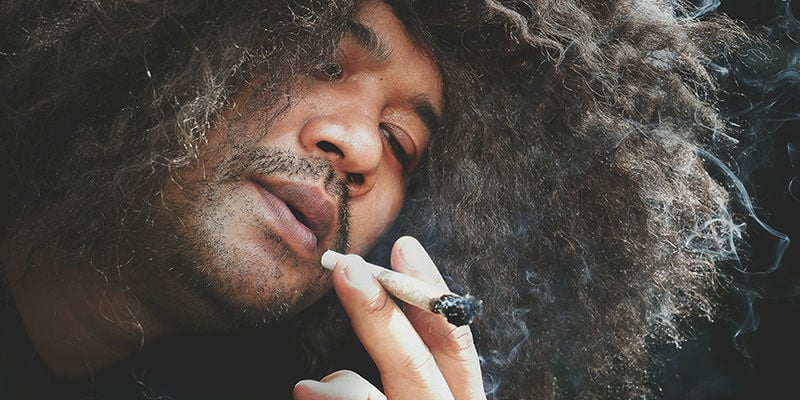
Many people have a complex relationship with their hair, and issues like hair loss and dandruff can affect people’s self-esteem. Recently, researchers have aimed to see if cannabinoids like CBD and THC can help to support hair growth and reduce scalp-related conditions. While the jury is still out regarding the efficacy of cannabinoids for these purposes, that hasn’t stopped companies from releasing all manner of cannabinoid-infused hair products. While we wait to see how things develop in the world of cannabis research, hopefully we will soon have more clarity about the plant’s effects on our hair.
- Bíró, T., Tóth, B. I., Haskó, G., Paus, R., & Pacher, P. . (2009). Trends in Pharmacological Sciences - https://linkinghub.elsevier.com
- Gregory Smith, & John Satino. (2021/03/25). Hair Regrowth with Cannabidiol (CBD)-rich Hemp Extract: A Case Series - https://publications.sciences.ucf.edu
- Gupta, A. K., & Talukder. (2022). A Cannabinoid Hairy‐Tale : Hair Loss or Hair Gain? Journal of Cosmetic Dermatology - https://onlinelibrary.wiley.com
- Kaufmann, Robert, Harris Bozer, Amber, Jotte, Amanda Rose Kube, Aqua, & Keith. (2023/12/20). The Effects of Long-Term Self-Dosing of Cannabidiol on Drowsiness, Testosterone Levels, and Liver Function - https://karger.com
- Popp, Meagan, Latta, Steven, Nguyen, Betty, Vincenzi, Colombina, Tosti, & Antonella. (2023, October). Cannabinoids for the Treatment of Hair, Scalp, and Skin Disorders: A Systematic Review - https://www.mdpi.com
- Vincenzi, Colombina, Tosti, & Antonella. (2020/11/13). Efficacy and Tolerability of a Shampoo Containing Broad-Spectrum Cannabidiol in the Treatment of Scalp Inflammation in Patients with Mild to Moderate Scalp Psoriasis or Seborrheic Dermatitis - https://karger.com
-
 5 min
January 20, 2022
How Cannabis Influences Dreaming
We hear stories from cannabis-loving friends about their sudden vivid dreams upon taking a weed break. Some of them even recall having more nightmares than usual. Is there a connection between...
5 min
January 20, 2022
How Cannabis Influences Dreaming
We hear stories from cannabis-loving friends about their sudden vivid dreams upon taking a weed break. Some of them even recall having more nightmares than usual. Is there a connection between...
-
 4 min
January 31, 2021
What Is Cannabis?
Sometimes we get so wrapped up in what strain to buy that we forget about the fundamentals of cannabis. Fortunately, we've put together the ultimate beginner's guide. So, whether you're a novice or...
4 min
January 31, 2021
What Is Cannabis?
Sometimes we get so wrapped up in what strain to buy that we forget about the fundamentals of cannabis. Fortunately, we've put together the ultimate beginner's guide. So, whether you're a novice or...











 United States
United States








